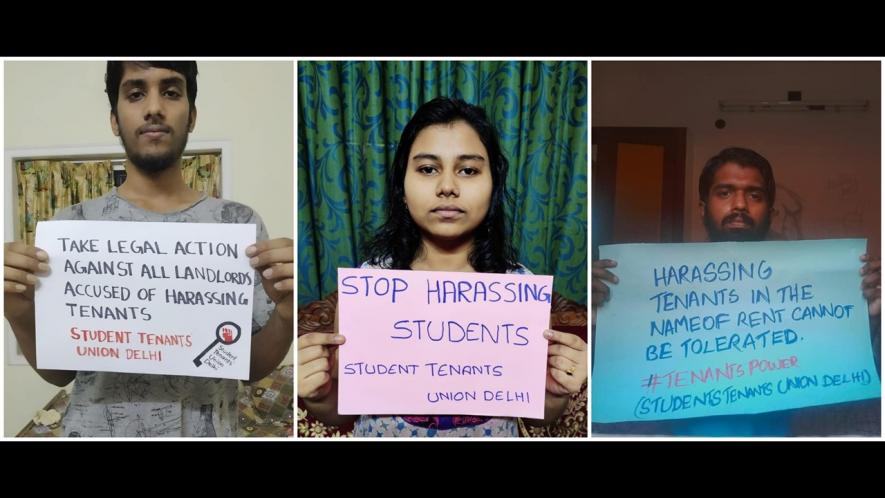How a Students’ Collective is Helping Fellow Students Negotiate Tenancy Issues

Image Courtesy: Facebook
Being the capital city, Delhi is home to a range of national institutions and premier colleges, and draws a huge number of students from across India each year. The students, however, experience multifaceted challenges in their pursuit of higher education in the heavily populated and expensive city. They end up crammed in small rooms with more than four to five fellow residents so that rent is shared.
Massive privatisation of education has led to fee hikes, withdrawal of government fellowships and a hostel crisis. It has put the burden of education entirely on the students. For most parents, the safety of women in the capital is a matter of serious worry. Not only is the rent on the higher side, the students are often faced with discrimination and made to go through several ordeals, including harassment. The problem for the student-tenants begin right from finding their first room, and follows them throughout their course.
These persisting problems are compounded when students are to their own devices during a pandemic. Those from unprivileged backgrounds are particularly vulnerable. Identifying these factors as ones which may have a major impact on students’ education, the Students’ Federation of India (SFI) formed the Students’ Tenant Union in Delhi.
Satarupa Chakraborty from the Tricontinental Institute for Social Research spoke to Kriti Roy and Varkey Parakkal – members of the SFI, to understand the present conditions of student-tenants. The interview elaborates on how and why the union was formed and the nature of problems being faced by the students after the sudden announcement of the nationwide lockdown.
Satarupa: The Students’ Tenant Union is a new way of organising students who are tenants. What led to the formation of the union in Delhi? Why did you choose the lockdown as the time to do go through with this?
Varkey: The idea of a Tenants’ Union might be a new one in India, although there have been tenancy movements in the past. But a tenants’ union as a concept is alien to India. It is a fairly old and effective way that workers, students and women across the world have used to organise themselves. This idea is from as far back as 100 years when some of the first rent strikes happened in Ireland, the United Kingdom and in both North and South America. It has been an effective method of organisation and it is time that India catches up. Considering the present crisis, it is an important intervention.
The Delhi University (DU) has 16 faculties, 86 academic departments, 77 colleges and 5 other institutes spread across the city. It caters to 1,32,435 regular students (1,14,494 undergraduates and 17,941 postgraduates). There are 2,61,169 students in non-formal education programmes (2,58,831 undergraduates and 2,338 postgraduates). Out of about four lakh students in total, only 15,000 students on an average have hostel facility. A large majority of the students do not have a housing facility. One of the major demands of the students is affordable housing, construction of new hostels and increasing accommodation facilities. This hostel crisis needs to be addressed with both long-term and short-term plans. As the construction of hostels to provide housing for four lakh students would take long, an immediate and short-term solution was required. We formed the Students’ Tenant Union to address the problems faced by students who stay in privately rented apartments, or private hostels as paying guests.
As tenants, the students are unorganised. Due to the lack of an organisation of which they can be members, there is a ghettoisation of the students according to their native states. There is no sense of a community.
In addition, the landlord-tenant relationship is largely exploitative. When I came to Delhi and was looking for a house, I faced discrimination. Many landlords would ask for details like caste, our food habits and other such details, which are not required for giving an apartment on rent. Their judgement is often based on prejudice and misconceptions about food habits, primarily against Keralites and students from the north-east. In addition, the discrimination faced by students is based on how they look, the region they come from, the religion they belong to or their caste.
The private housing sector has its own set of problems. Most of the house owners do not follow the guidelines laid down in the tenancy laws. In most cases, a rental agreement is denied. Landlords do not follow the rent control authority guidelines. They increase rent and charge for electricity and water arbitrarily. These issues have persisted for long. Besides, the university leaves the students on their own. There are no regulations. As a result, students who stay outside the campus are not entitled to any concessions, but go through harassment.
DU has faced a shortage of hostel accommodation for 50 years. In areas adjacent to DU-affiliated colleges, students have been residing in private residencies for long. Due to the lockdown, many families suffered because of a lack of income. A lot of students work after college hours for rent and their sustenance. The sudden lockdown affected a large section of students who were staying in a rented hostel or house. The pandemic made their problems more visible.
The Delhi Government and the Union Home Ministry came out with two similar orders which said that ‘tenants’ (workers and students) should not be harassed for rent; there should not be threats of eviction. Aside from issuing these orders, there was very little interest on part of the government to enforce them in real life. In most of the cases, landlords actually threatened students with eviction. It is in this context that the Student Tenants’ Union was formed.
Satarupa: Usually, movements result in the formation of unions. But, in Delhi, there was no movement for the Student Tenants as such. How did this idea materialise?
Varkey: Almost a year ago, our organisation discussed the formation of the student tenants’ union in its State Committee meeting. Despite our limited strength in the university, we conducted a survey to understand the various dynamics of the issue like the amount they pay as rent or how many students live in which area and the like. The survey work was disturbed by political exigencies – after political violence unleashed by the Akhil Bharatiya Vidyarthi Parishad (ABVP) activists on SFI activists in DU.
With the sudden announcement of the lockdown, we experienced a rise in the harassment of student tenants. Meanwhile, the MHA and Delhi Disaster Management Authority passed the aforementioned orders, and, in a press conference, Chief Minister Arvind Kejriwal said ‘do not harass the tenants; if the tenants are not able to pay the rent, the government will pay it on behalf of the tenants’. Unfortunately, this was a hollow promise. However, the situation began to get worse, prompting us to form the tenants’ union.
The union for student tenants proposed a rent strike. We demanded that the government must freeze rent and the government should pay the landlords (as much of their income comes from rent) on behalf of the tenants. We understood, that without an organised movement and without a rent strike, the government would not be serious about the issue of student tenants. So, we felt this was the right moment to start the union.
Satarupa: How many people are involved with the union as of now, and how do they work?
Varkey: There is no formal structure yet. We are working as a coordination group. There are about 35 to 40 people from across Delhi in the coordination group. There are experienced student activists and we have divided the responsibilities among ourselves. Student activists who are residents of a particular area are responsible for it.
Satarupa: What was the experience after forming the union like? How did the union respond to issues faced by the students?
Kriti: As soon as the union was formed, our helpline numbers received a number of calls and recordings. In particular, we received several calls from student residents of a certain women's PG in DU’s North Campus, with the students being threatened with eviction. Rent was being demanded from them. Despite the students informing the landlord of the government order the landlords replied, ‘this is a private hostel and we don’t care what the government order states. You have to pay rent or we will discard your stuff’. We immediately went to the Model Town Police Station and filed a complaint against the landlord of the PG. It was a joint complaint filed by the SFI and the Student Tenants Union-Delhi.
We circulated the copy of the complaint online and in various student WhatsApp groups; the response was very positive. It gave a sense of confidence to the students and the response of the police was also positive. They have assured us that the orders are in place and they would intervene in such cases of harassment. The complaint reached the owner of the PG as well. Since then, the threats have reduced. The owner tried to pit the resident students against the union. He created a false sense of panic, saying that the police would shut down the hostel and its residents would be forced to leave. We started receiving distress calls from the students living there. We then explained the scare mongering at play and assured them of our support.
Once a copy of the complaint copy was circulated, many students from other PGs approached us too, saying they had faced similar issues. We sent out our helpline numbers to areas of Delhi where a large number of students reside, and formed social media groups for circulating information and for reaching out. We also formed a separate WhatsApp group with students who are facing problems in order to create a sense of unity and collective action.
We spoke to several landlords after being approached by students and informed them about the order and the consequences of any violation. As per our records, many landlords stopped threatening the students after we spoke to them. The students who benefitted helped spread the word around.
Initially, we were getting two to three calls per day. The rate of distress calls has increased now. This problem is only going to escalate as there is no clarity about when the students have to pay rent.
Satarupa: What were the demands raised from the union?
Kriti: According to our experience, many students are asking landlords to adjust the rent against their reimbursable security deposit. Once the security deposit is exhausted, the landlords would eventually ask for more money or ask them to vacate the house. Many students are also scared that they would have to pay rent for three to four months at once. The union, therefore, took the step of pushing the government to intervene, and has prepared to launch a struggle around some key demands.
As a first step, the union wrote to the Chief Minister with four demands. Firstly, the rent should be waived off for the students for the lockdown months. In a press conference, Kejriwal had promised that the government would bear the rent of those who could not afford it. Second, the government has to compensate landlords for the loss of rent, as some of them survive on rent as their sole means of income. Third, strict action should be taken against landlords who don’t comply; and finally, by incorporating all these demands, there should be a new circular issued by the government clarifying these issues.
Satarupa: What impact does the rent (borne by the students) have on their higher education, particularly for those who hail from unprivileged backgrounds?
Varkey: For the majority of students and their families, higher education is a financial calculation. What will we get in return after spending so much for the child’s education? It is an understandable concern for low-income families. Due to the state’s unwillingness to fund the students’ education, it essentially remain available on for a section of few privileged. For a large section in Indian society, sending children to school is a calculated financial decision.
In universities like DU, the cost of housing takes up 70% of the student’s expenses. We currently live in an apartment which costs us between Rs 5000 and Rs 7000 per month. This is what a student spends for housing in DU’s North Campus area. My educational fee for the entire semester is Rs 4000. I end up paying a much higher rent than my fees. With other costs included, my expenses are too high for someone from an unprivileged background.
A large section of DU students are from marginalised sections; they come from low income families. They study here because the education is fairly cheap, but housing and other related expenses are very high. If the government refuses to come out with an order compensating the accumulated rent over the period of lockdown, a lot of students would be forced to discontinue their studies.
In addition, education for girls is often considered a financial burden on the family. When the accumulated rent becomes an additional burden, many parents might force the women students to drop out. It will increase the gender divide in access to education.
Satarupa: Do students who call in times of distress appear vulnerable?
Kriti: We came across many students who belong to working-class families; many of their parents are daily wage workers. With the pandemic and the lockdown, they lost income. For this class, sustaining their children’s education by paying rent is untenable. It would lead to a massive drop-out of students from higher education.
In addition, the vulnerability of women students is evident from the distress calls we received. In one of the cases that we were involved in, a female tenant was molested by the landlord. The latter also suggested they negotiate rent in lieu of sexual favours by the female tenant. The tenant filed a police complaint and the union extended legal help and assisted her through the entire process. Eventually, the molester confessed his crime and gave a written apology.
Get the latest reports & analysis with people's perspective on Protests, movements & deep analytical videos, discussions of the current affairs in your Telegram app. Subscribe to NewsClick's Telegram channel & get Real-Time updates on stories, as they get published on our website.
























